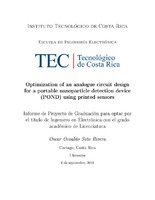Mostrar el registro sencillo del ítem
Optimization of an analogue circuit design for a portable nanoparticle detection device (POND) using printed sensors
| dc.contributor.advisor | Méndez-Badilla, Luis Paulino | es |
| dc.contributor.author | Soto-Rivera, Oscar Osvaldo | |
| dc.date.accessioned | 2019-03-14T14:16:56Z | |
| dc.date.available | 2019-03-14T14:16:56Z | |
| dc.date.issued | 2018 | |
| dc.identifier.uri | https://hdl.handle.net/2238/10407 | |
| dc.description | Proyecto de Graduación (Licenciatura en Ingeniería Electrónica) Instituto Tecnológico de Costa Rica, Escuela de Ingeniería Electrónica, 2018. | es |
| dc.description.abstract | The growing use of nanoparticles in different sectors of the industry has generated interest in their study to understand the effect they have on the human body and the environment. The Neuroelectronics group at the Technical University of Munich is conducting a research to develop a portable device for the detection of silver nanoparticles in situ. Taking advantage of the widespread use of cell phones it is possible to use the computational capacity of these to establish communication with the sensor and carry out relevant analyzes for the study of silver nanoparticles. Due to the importance that the analog circuit has in the record of small signals generated by the silver nanoparticles, this project focuses on the study of this to characterize and reduce the thermal and electromagnetic noise as well as to determine its frequency response. In addition, using Altium designer software, the power management PCB was developed to provide the system with portability. In this work, the design process is detailed from the selection of components, through the schematics and layout to the assembly and verification of the PCB. | es |
| dc.description.sponsorship | Technical University of Munich | es |
| dc.language.iso | spa | es |
| dc.publisher | Instituto Tecnológico de Costa Rica | es |
| dc.rights | acceso abierto | es |
| dc.subject | Electroquímica | es |
| dc.subject | Sensores | es |
| dc.subject | Ruido | es |
| dc.subject | Administración | es |
| dc.subject | Detección de partículas de plata | es |
| dc.subject | Research Subject Categories::TECHNOLOGY::Electrical engineering, electronics and photonics::Electronics | es |
| dc.title | Optimization of an analogue circuit design for a portable nanoparticle detection device (POND) using printed sensors | es |
| dc.type | proyecto fin de carrera | es |


